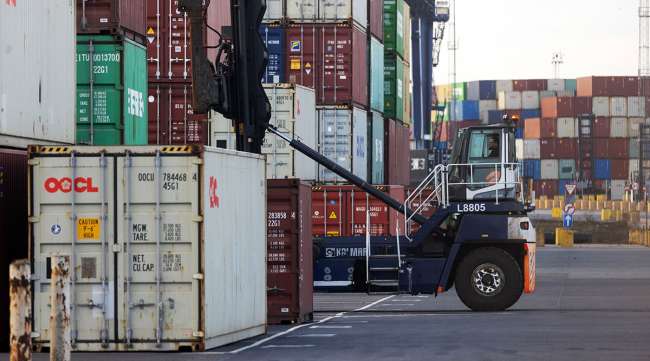A worker moves a shipping container at Felixstowe port in Felixstowe, United Kingdom, on April 9. (Chris Ratcliffe/Bloomberg News)
Several small U.S. businesses sued President Donald Trump over his “Liberation Day” tariffs in the latest legal challenge to his use of sweeping executive powers to extract concessions from foreign trade partners.
Trump’s use of the International Emergency Economic Powers Act to impose tariffs is unconstitutional, and the emergency he declared to justify the levies “is a figment of his own imagination,” the companies said in a suit filed April 14 in the U.S. Court of International Trade. “Trade deficits, which have persisted for decades without causing economic harm, are not an emergency.”
The suit is at least the third challenging Trump’s tariffs, though some industry groups in the U.S. have been hesitant to oppose the levies in court. IEEPA gives the president broad power to regulate certain financial transactions when declaring a national emergency in response to an “unusual and extraordinary threat.”

Trump
Trump became the first president to use the statute to impose tariffs when he announced levies in February against China, Mexico and Canada to respond to the “extraordinary threat” of undocumented immigrants and illegal drugs moving through U.S. borders.
On April 2, Trump invoked IEEPA on what he called “Liberation Day” to impose a blanket 10% tariff on all imports and put additional duties on almost 60 countries. But a week later, he announced a 90-day pause on the additional tariffs on most countries while boosting duties on Chinese imports to 125%, which he increased to 145% the following day.
The moves by Trump have rattled markets, prompted forecasts of a potential recession and strained relationships with overseas trading partners.
The suit was filed by the libertarian-leaning Liberty Justice Center on behalf of five small companies, including a New York-based wine distributor, a Vermont-based brand of women’s cycling apparel, and a Virginia-based producer of educational electronic kits and musical instruments.
An earlier suit was filed by the conservative-funded New Civil Liberties Alliance on behalf of a small stationery business called Emily Ley Paper, which opposed the first two rounds of China tariffs. A separate suit was filed by members of the Blackfeet Nation, a Native American tribe in Montana benefiting from trade with Canada.
“This court should declare the president’s unprecedented power grab illegal,” said attorneys representing the companies in the April 14 lawsuit. They argued that their clients will face increased “costs for the goods they sell, less demand for their higher-priced products and disrupted supply chains, among other threats to their livelihood, up to and including potentially bankrupting otherwise-solvent companies.”






